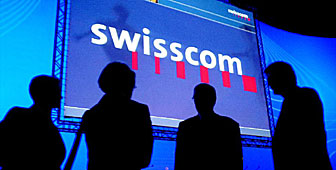Swisscom sitting pretty

As the world's telecoms giants buckle under huge debts, Swisscom is sitting on a hefty cash pile thanks to some prudent decisions at the height of the boom.
The decision by WorldCom, America’s second-biggest long-distance phone company, to file for bankruptcy has put the industry’s strategy of aggressive acquisition and the high prices paid for third-generation mobile phone licences under the spotlight.
Swisscom was also swept up in the growth frenzy of the 1990s and invested abroad but subsequently made a number of crucial decisions including withdrawal from the expensive German UMTS auction.
Swisscom is a pygmy in Europe, ranking seventh in the market behind giants such as Deutsche Telekom, British Telecom, Telecom Italia, Spain’s Telefonica, the UK mobile phone giant, Vodafone and France Télécom.
Vast debts
However, big operating companies such as Deutsche Telekom and France Télécom have vast debts respectively of €67 (SFr97.5 billion) and €65 billion.
“The main problem is that all the telecoms were forced to join the boom and growth was the first priority,” Serge Rotzer, a telecoms analyst with Zurich Cantonal Bank, told swissinfo.
“Today the situation is very bad because all these companies have bought other companies as well as UMTS licences at a very expensive price.”
Not only did the companies build up a huge level of debt acquiring third generation mobile phone licences and investing in new mobile, data and Internet services but it is taking even longer than expected to recoup the cost of the licence and network investments.
“The big question at the moment is how they can refinance,” said Rotzer. “And the problem is stock prices now are so low that they can’t find any capital.”
Cash pile
Swisscom, however, has emerged from the turmoil of the last few years in a fairly comfortable position. The company posted net profits of SFr4.9 billion in 2001 and is sitting on a cash pile of about SFr3 billion.
The reasons lie in a series of deals conducted before the market went sour.
In 2000, Swisscom spun off its mobile phone division and sold 25 per cent of the subsidiary to UK mobile phone giant Vodafone for SFr4.5 billion
The purchase of German mobile provider Debitel also appears to have been a sound investment.
Above all, the decision to withdraw from the German UMTS auction in August 2000 when the six successful bids totalled more than €50.5 billion – five times what the government had been expecting – has been validated.
“They made the right step in Germany,” said Rotzer. “They also wanted to buy a UMTS licence but decided the price was too high and got out of the auction.
“Similarly, they had money, they wanted to buy firms, and make acquisitions but they didn’t find a company which was suitable.”
“Its strategy was pretty intelligent,” agreed independent financial analyst, François Savary. “Swisscom refused to pay any old price for a UMTS licence and has not wasted its funds in adventurous acquisitions.”
Clouds on the horizon
By way of international comparison, the picture appears bright. But even for Swisscom, there are a few clouds on the horizon. The company is in the process of shedding some 6,000 jobs.
Meanwhile in a move to liberalise the market, the government wants Swisscom to give its rivals access to the local loop, the connections between telecoms switches at its local exchanges and individual customers.
Moreover the Swiss telecommunications market is saturated and the company is too small to be an effective global player.
“Our potential for growth in Switzerland is almost null,” Swisscom’s chief executive, Jens Alder told shareholders earlier this year. “Our only option is to focus on niche segments of the market which do not interest our larger rivals.”
Swisscom shares are currently trading at around SFr430. The Swiss state has a 62.7 per cent stake in Swisscom after reducing it from 65 per cent as part of a SFr10 billion share buyback by the company in March.
by Vincent Landon

In compliance with the JTI standards
More: SWI swissinfo.ch certified by the Journalism Trust Initiative








You can find an overview of ongoing debates with our journalists here . Please join us!
If you want to start a conversation about a topic raised in this article or want to report factual errors, email us at english@swissinfo.ch.